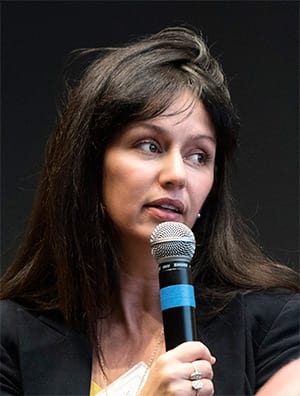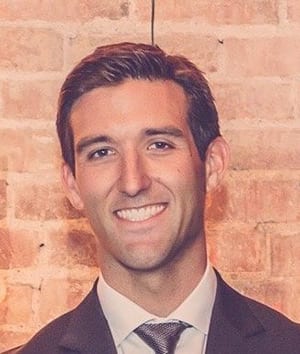
By Susan Gluss
Activist lawyers, not in-house counsel, are typically seen as change agents who advocate for human rights laws, environmental protections, fair wages, and more. But the role of general counsel is undergoing a seismic shift, propelled in part by consumer pressure on companies to drive positive change, not just reap profits. Berkeley Law has emerged as an influential leader in that movement, spearheaded by its Business in Society Institute.

Amelia Miazad ‘02, the institute’s founding director and senior research fellow, said, “Corporate lawyers have to consider what is right, not just what is legal. Companies now have to think about environmental, social, and governance issues, and that falls squarely within the role of the general counsel.”
Miazad co-founded the institute with Adam Sterling ’13, executive director of the law school’s Berkeley Center for Law and Business. The institute is a “natural fit” for the center, Sterling said: “It builds on our efforts to teach aspiring lawyers, practitioners, and entrepreneurs that social accountability is just as important as, and often central to, a company’s bottom line.”
The evolving corporate role raises complex legal and ethical questions that in-house attorneys must navigate. To better understand the changing legal landscape, the institute is hosting international and U.S. symposia, conducting research, developing student internships, and creating new curriculum and courses. It’s one of the first law school programs in the country to tackle these issues head-on.
Case studies
Students in the fall 2017 Business in Society course met with general counsels who are respected change advocates in companies such as Salesforce, Nestlé, Cliff Bar, Levi’s, and Lyft. The GCs spoke about the challenge of navigating risk in times of crisis, and the importance of giving strategic—not just technical—advice to their CEOs and boards.
For Nestlé, it started with a shocking accusation that one of its third-tier fish suppliers in Thailand trafficked in forced labor. Instead of quitting the market, Nestlé voluntarily worked to end the illegal practice.
“The company partnered with the NGO that was investigating the supply chain in Thailand. They published the NGO’s report on forced labor, and then worked with the Thai government to make sure it knew how to enforce local laws. It’s an example of how lawyers are weighing not only legal risk, but also reputational risk,” Miazad said.

Lauren Kelly-Jones ’19, who developed the Nestlé case study, said she’s “come to view social justice as intrinsic to business purpose and truly believe in its ability to shape the world for good.”
For Salesforce, it’s a business imperative. In 2015, it threatened to pull its business from states that had passed anti-LGBTQ laws. As General Counsel Amy Weaver told GC Magazine, the company “had an obligation to be on the front lines of these discussions publicly, which is consistent with our core values, one of which is equality. … Businesses are becoming very powerful platforms for change and, when you have that power, it is imperative to be able to put it to use in a positive way.”
Radical transparency
At a sustainable business forum co-sponsored by the institute in November, Nestlé General Counsel of Zone Americas Esteban Mezzano reinforced the need for public accountability. “We’re very clear that there’s no place to hide anymore,” he said, and advised in-house counsel to push for what he called, “radical transparency.”
“Being radically transparent is the next frontier, and it’s the only way to do business in the future. Consumers demand it,” Mezzano said.
At a panel on the fiduciary duties of corporate boards, Bob Eccles, a renowned sustainability expert, said the role of general counsel has been under-researched—until now—and applauded Berkeley Law for its initiative. The former Harvard Business School professor is collaborating with Miazad on institute research.
Ben Toussant ’18, who’s been researching the evolving roles of general counsel and chief compliance officers, said the role of GC has “changed drastically” in the last two decades.

“Modern GCs are … tasked with guiding a company through a number of ‘business in society’ issues such as ethics and reputation, communications and public policy, corporate citizenship and sustainability,” Toussant wrote in an email. “Their advice is usually grounded in the business case: The GCs explain how and why a particular course of action makes sense from a business perspective.”
Social justice DNA
As the role of GC evolves, it’s critical that law schools prepare its students for the job, said Professor Richard Buxbaum ’53, an ardent institute supporter.
“Just as schools of engineering and of business administration now educate their students to take their place in eventual CEO, COO, and CFO positions, so schools of law need to prepare their graduates for leadership in the general counsel pipeline,” Buxbaum said.
Levi’s General Counsel Seth Jaffe agreed that the course provided essential training for aspiring attorneys.
“Law students today are looking for ways to make a difference, not only in their firms or their companies, but in their communities and the world as a whole. … They must learn early on how the general counsel can work strategically to lead corporations toward productive and beneficial roles in society,” Jaffe wrote in an email.
Berkeley Law’s global constituency and social justice DNA make it ground zero for this seminal work, said Miazad. She recently co-led a sustainability “GC Think Tank” in Santiago, Chile, with institute students Ariana Schafer ’18 and Sarah Mirzai ’18.
“Traditionally, in legal education, social justice and environmental curriculum has been siloed from business curriculum, and that’s not how companies are approaching the world,” Miazad said. “So, Berkeley Law, with its strong social justice mission, its strong business curriculum, and its students’ hunger to change the world, is a natural place for this important work to thrive.”